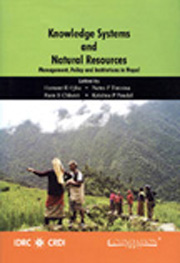Book contents
- Frontmatter
- Contents
- Preface
- Abbreviations
- Glossary of Nepali Words
- 1 Knowledge Systems and Deliberative Interface in Natural Resource Governance: An Overiew
- 2 Agricultural Technology Development in Nepal: Critical Assessment from Knowledge System Perspective
- 3 Contested Knowledge and Reconciliation in Nepal's Community Forestry: A Case of Forest Inventory Policy
- 4 From Grassroots to Policy Deliberation: The Case of Community Forest Users' Federation in Nepal
- 5 From Isolation to Interaction: Increasing Knowledge Interface in Chhattis Mauja Irrigation system in Nepal
- 6 Action Research Experience on Democratising Knowledge in Community Forestry in Nepal
- 7 Culturally Embedded Knowledge in Irrigation: People's Ways of Thriving in a Himalayan Village
- 8 Deliberative Knowledge Interface: Lessons and Policy Implications
- About the Contributors
Preface
Published online by Cambridge University Press: 26 October 2011
- Frontmatter
- Contents
- Preface
- Abbreviations
- Glossary of Nepali Words
- 1 Knowledge Systems and Deliberative Interface in Natural Resource Governance: An Overiew
- 2 Agricultural Technology Development in Nepal: Critical Assessment from Knowledge System Perspective
- 3 Contested Knowledge and Reconciliation in Nepal's Community Forestry: A Case of Forest Inventory Policy
- 4 From Grassroots to Policy Deliberation: The Case of Community Forest Users' Federation in Nepal
- 5 From Isolation to Interaction: Increasing Knowledge Interface in Chhattis Mauja Irrigation system in Nepal
- 6 Action Research Experience on Democratising Knowledge in Community Forestry in Nepal
- 7 Culturally Embedded Knowledge in Irrigation: People's Ways of Thriving in a Himalayan Village
- 8 Deliberative Knowledge Interface: Lessons and Policy Implications
- About the Contributors
Summary
The book is the outcome of a research project ‘Management of Knowledge System in Natural Resources: Exploring Policy and Institutional Framework in Nepal’ undertaken by ForestAction Nepal with support from the International Development Research Centre (IDRC), Canada. When we completed the research project with a set of case studies and a review of theories related to knowledge systems and governance and shared the findings with a network of readers, we were excited to get very encouraging feedback. This encouraged us to compile the work as a book so that the empirical findings and insights emerging from the analysis could be disseminated to a wider audience. While preparing the case study reports, we realised that the insights could be potentially beneficial to the policy makers, researchers, planners and field practitioners for developing an understanding of the knowledge systems and their deliberative interface. This idea was materialised with a generous and continued support from IDRC.
We hope that the compilation of case studies on natural resources, in the light of critical and theoretical insights, will help one understand the intricacies of knowledge systems as they relate to governance practices. There is indeed a continuing need for better understanding of the contexts, processes and outcomes of the production of knowledge and its application in various facets of governance of human society. In this context, our main goal of presenting the case studies in this book has been to understand how different systems of knowledge operate in the field of natural resource management, and what factors and conditions affect the process of deliberation among such knowledge systems.
- Type
- Chapter
- Information
- Knowledge Systems and Natural ResourcesManagement, Policy, and Institutions in Nepal, pp. vii - ixPublisher: Foundation BooksPrint publication year: 2007

